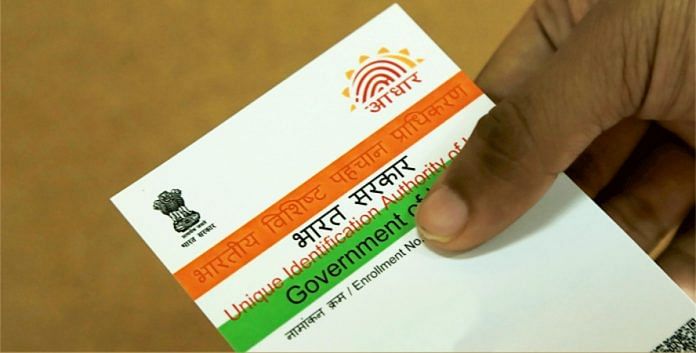New Delhi: A report backed by UNDP (United Nations Development Programme) has said that Aadhaar, India’s biometric ID system, is an example of the good and bad sides of implementing digital governance in the global South, where marginalised communities lack access to the internet.
Global South refers to “the less economically advanced countries of Africa, Asia, and Latin America collectively”.
Released last week (22 June), the report is titled ‘Democratizing The Digital Space: Harnessing Technology to Amplify Participation in Governance Processes in the Global South’.
It has been written by authors from New Delhi’s Centre for Policy Research, in joint collaboration with UNDP’s (United Nations Development Programme) Oslo Governance Centre and ‘Southern Voice’, a platform “producing, promoting, and disseminating evidence-based policy analysis by researchers from Global South countries”.
The report says that while Aadhaar has increased state welfare capacity, the decisions on how much payment a family or individual qualifies for is “based on a universal threshold for the poverty line” instead of “an inclusive set-up open to all users in need”.
This means, said the authors, that “if you earn even slightly more than the poverty line, you will be deemed ineligible for poverty alleviation schemes by a process of automated exclusion”.
The report also notes, “Centralisation of welfare schemes through digital technologies…not only has the potential to digitally entrench the inaccessibility of the state, but also to remove incentives for its localisation, and in turn, limit its capacity. Centralisation also risks reducing the state’s direct accountability, and local capacity to reform.”
The report further explores how online platforms, ranging from government services to social media, have impacted the global South.
While digital services like social media have helped citizens living in “autocratic regimes” to voice their dissent, “states have quickly learnt how to monitor, influence and even weaponize digital platforms”, the paper states.
It also notes that to create a world where digital technologies “work for democracy and human rights, and not against them” requires “focusing on the impacts of technology, their adoption, and international and national regulatory frameworks, while ensuring the equitable representation of the people and interests of the global South”.
Also read: Fewer cords, e-waste — decoding new EU rule that mandates one charger for phones & tablets
Good, bad sides of digital governance
Aadhaar, the report says, is an example of “the dual-natured implications of digital governance”.
The authors describe Aadhaar as a programme the Indian government “imagined” to be a “one-stop digital unique ID system to integrate social programmes and user identities” so that welfare payments can be transferred to user accounts directly, and can integrate multiple bank accounts into a single ID.
An upside of Aadhaar, the report notes, is that it has “allowed for reduced leakages by way of governmental corruption and has incentivized workers entering the formal economy, increased state welfare capacity and reduced transaction costs”.
But a system where funds and welfare schemes are centralised has also led to reduced ways in which “marginalised populations” can interact with the government, the report says.
The report has also flagged how Aadhaar “has been challenged in the courts due to its data collection procedures, which were said to violate privacy norms, and issues with data leakages”.
Rules for social media platforms in India
The report notes how inadequate content moderation regulations has led to “anti-Muslim riots in India”.
There is a need to change the definition of social media platforms to better regulate them, the report states. It has highlighted that the current definition for social media platforms as intermediary hosts, which the US Congress came up with when internet companies were still at a nascent stage, does not work any more in the context of current challenges around social media content.
The report also notes that social media sites have especially been unable to effectively moderate content — to remove violent or false information — in the global South. There exists a “wide gap” in the level of content moderation efforts taken for countries in the global North compared to the Global South, it further says.
As an example of inadequate content moderation in the global South, the report says the “moderative oversight in the global South can directly be linked to harmful events such as the anti-Muslim riots in India or the violence in Ethiopia”.
Also read: Facebook didn’t act on fake accounts ‘tied’ to BJP MP, alleges ex-employee, presents ‘proof’



